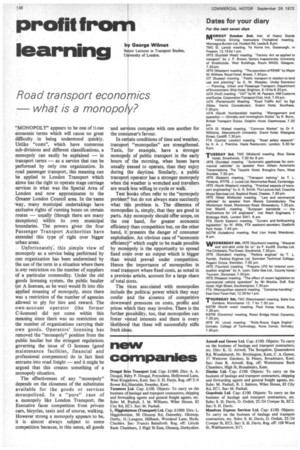profit from learning
Page 418

If you've noticed an error in this article please click here to report it so we can fix it.
by George Wilmot Senior Lecturer in Transport Studies, University of London.
Road transport economics what is a monopoly?
"MONOPOLY" appears to be one of ti,ose economic terms which will cause no great difficulty in being understood quickly. Unlike "costs", which have numerous sub-divisions and different classifications, a monopoly can easily be explained in transport terms as a service that can be performed by only one organization. In road passenger transport, this meaning can be applied to London Transport which alone has the right to operate stage carriage services in what was the Special Area of London and now approximates to the Greater London Council area. In the 'same 'way, many municipal undertakings have exclusive rights of running buses on certain routes usually (though there are many exceptions) within its own municipal boundaries. The powers given the four Passenger Transport Authorities have extended this type of right over bigger urban areas.
Unfortunately, this simple view of monopoly as a service being performed by one organization has been undermined by the use of the term in a situation where there is any restriction on the number of suppliers of a particular commodity. Under the old goods licensing system, the public haulier (or A licensee, as he was) would fit into this applied meaning of monopoly, since there was a restriction of the number of agencies allowed to ply for hire and reward. The own-account operator (the former C-licensee) did not come within this meaning since there was no restriction on the number of organizations carrying their own goods. Operators' licensing has removed the "monopoly" position from the public haulier but the stringent regulations governing the issue of 0 licenses (good maintenance facilities, financial and professional ,competence) do in fact limit entrants into road freight and it might be argued that this creates something of a monopoly situation.
The effectiveness of any "monopoly" depends on the closeness of the substitutes available for the goods or services monopolized. In a "pure" case of a monopoly like London Transport, the Executive faces competition from private cars, bicycles, taxis and of course, walking. However strong a monopoly appears to be, it is almost always subject to some competition because, in this sense, all goods -and services compete with one another for the consumer's favour.
In certain conditions of time and weather, transport "monopolies" are strengthened. Taxis, for example, have a stronger monopo y of public transport in the early hours of the morning, when buses have usually ceased to operate, than they enjoy during the daytime. Similarly, a public transport operator has a stronger monopoly when the weather is wretched and travellers are much less willing to cycle or walk.
Text books often refer to the "monopoly problem" but do not always state succinctly what this problem is. The dilemma of monopolies is, simply, that they are good in parts. Any monopoly should offer scope, on the one hand, for greater economic efficiency than competition but, on the other hand, it presents the danger of consumer exploitation. An obvious case of "economic efficiency" which ought to be made possible by monopoly is the opportunity to spread fixed costs over an output which is bigger than would prevail under competition. Hence the importance of monopolies in road transport where fixed costs, as noted in a previous article, account for a large share of total costs.
The vices asscciateci with monopolies include the politic at power which they may confer and the absence of competitive downward pressures on costs, profits and prices Viich they may involve. There is the further possibility, too, that monopolies can foster vested interests and there is every likelihood that these will successfully stifle fresh ideas.
































































































































































































































































































































































































































































































































